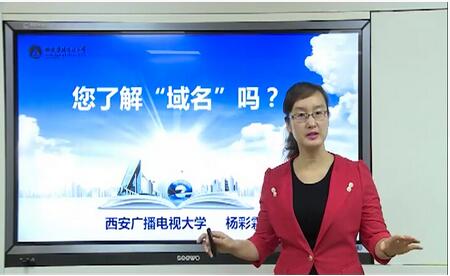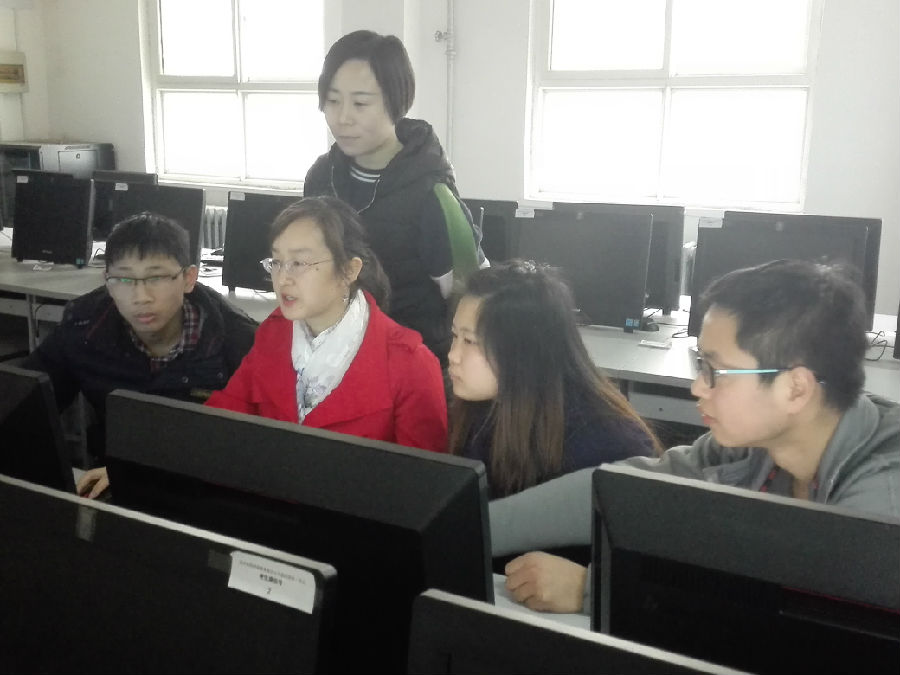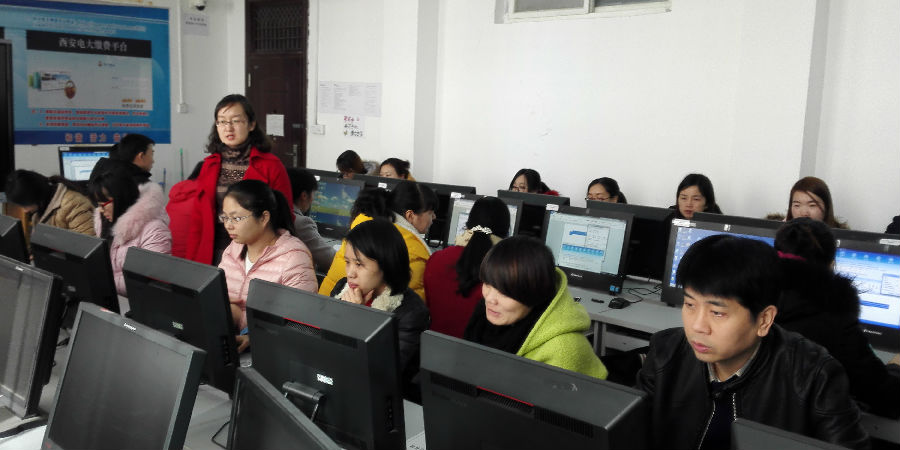 She began to be involved in distance education after graduation, and since then has been working to fulfill her oath to "pass along knowledge to RTVU students and raise the profile of distance education."
She began to be involved in distance education after graduation, and since then has been working to fulfill her oath to "pass along knowledge to RTVU students and raise the profile of distance education."

In the physical classroom, she solicits feedback from her students, and in the online classroom gives them a questionnaire to investigate their study habits. To help improve their ability to study independently, she has looked for a number of ways to focus on what they want to study part-time on their own; explored and put into practice changes to the way teaching is delivered; and developed flexible and accessible teaching resources. Her name is Yang Cailin, and she is a tutor at the Xi'an Branch of the OUC.
Adapt to student needs and reform teaching methods

"Excuse me, Ms. Yang, how do you generate the catalog?" "Excuse me, Ms. Yang, can you show me why the format of the characters that I've input has changed?" "Oh, my god! Ms. Yang, my documents have disappeared!" These are the kinds of things she hears every day in her Computer class. The students who take this course come from different regions and schools, are of different ages, and have different professional backgrounds. Their grasp of basic computer skills varies greatly. Some often use the computer to play online, and understand its basic operations, but are not earnest about studying, and feel the course is unnecessary for them. Others have never or seldom operated a computer, find computers mysterious and difficult, and lack even the most basic skills. This variety of levels makes teaching difficult, since the tutor faces a variety of questions and a variety of problems.
Given all of this, she became deeply aware that if she followed the scheduled teaching plan, some students would learn well, or even find it too easy, but others, especially those from disadvantaged groups, would hardly learn at all. Therefore she decided that she could not confine herself to the textbook and traditional methods, but had to adapt to the actual situation of her students.
She began to investigate the students in her class, and based on their levels, abilities and needs began to make changes to her teaching. For the Computer Application Basics course, she broke the traditional teaching rules and changed the order in which she delivered the course contents to begin with basic knowledge and move to information retrieval, editing, and classification. In this approach, collecting and retrieving online information resources is the starting point, allowing students to carry out retrieval, editing, processing, statistical analysis and classification of the material. This teaching method not only gives students a grasp of the course material, but also improves their ability to deal with practical problems and to operate a computer.
With a learner-centred approach, she made bold reforms based on the backgrounds of her students, and achieved satisfactory results, being named “excellent tutor” for her performance in 2013 at the Xi'an RTVU. In 2014, she was named the “new teaching star” in the adult-education division there, and in 2015, was awarded first prize in the "I Teach, I Show” teaching-skills competition at the Xi'an RTVU for a lecture that was broadcast on Xi'an Education TV.
Guide students with great patience and provide help through various channels
"Ms. Yang, I've passed the Computer Application Basics examination. I'm going to obtain my Bachelor degree!" A student named Li Pingping called her to share her great joy. She was a Class of 2014 Accounting major who had been working in the field for several years, and gained a great deal of experience. Her misfortune was to have never gotten a chance to go to university and gain a Bachelor degree. To remedy this, she applied to Xi'an RTVU for further education. She had a low level of computer skills, and found the course difficult, but never missed a class, online or offline; sometimes her husband even accompanied her. Nonetheless, she failed the examination twice, and in distress contacted Ms. Yang for guidance. Ms. Yang made her a detailed study plan, loaned her a PC configured with computer-practice software, and asked her to use the software for 30 minutes every day. Ms. Yang was able to provide guidance and help with problem-solving via QQ, and after four months, in December of 2016, Li Pingping finally passed the examination, obtaining the Bachelor certificate she had been dreaming of.

Ms. Yang has also made great efforts to provide teaching support. She created a QQ group for the Computer Application Basics course, distributing teaching materials and exchanging views with her students. For students unable to attend class, she created e-textbooks to assist them with independent study. In class, her preferred teaching method is to go from student to student and deal with each individually. She uses WeChat, Rain Classroom (an online smart classroom), and other platforms to answer questions and individualise her instruction.
Leverage information technology to develop learning resources
Ms. Yang says, "Teachers engaged in distance education must not only lecture to the best of their abilities, but also take advantage of modern information technology to create teaching resources that enable students to study independently anytime and anywhere."
To design the teaching contents, she went chapter by chapter, addressing the key concepts of each. For the website and course design, she divided the contents of the 12 chapters into four units: Basic Knowledge, Programming Language, Programming Tool, and Comprehensive Practice. She also developed an online course for this subject, integrating lecture videos, micro-courses, and lectures, to arrange a variety of learning activities, including course forums and online evaluations. She also combined online and offline learning. In the online courses, each chapter includes exercises and tests that can be accessed independently offline. The answers can then be submitted, and the results seen, with explanations of errors given. The online course also provides homework and tests that can be done anytime and anywhere.
With its clear teaching goals, strong basic instruction and orientation, prominent explanation of key points and difficulties, , ability to inspire active learning, and high-quality human-machine and tutor-student interactions, the online course came first in the MOE's 15th National Multimedia Courseware Competition, and was named an OUC Quality Course.
"Being a teacher is the most brilliant position under the sun." As an open-education tutor, Ms. Yang has not aspired to greatness, but has shown strong dedication to her profession, doing her best to constantly expand her own knowledge and to be a model for her students. She is conscientious and steadfast, and an excellent example of what it is to be a tutor at the OUC.
By Yang Cailin and Jin Hongyu, OUC